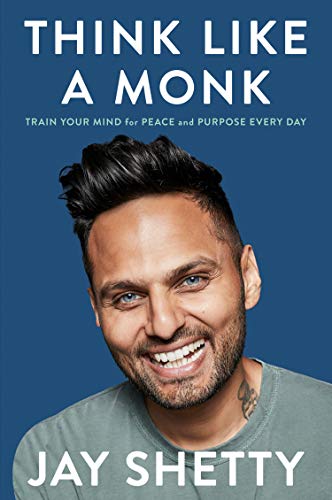What do you think?
Rate this book


Jay Shetty, social media superstar and host of the #1 podcast ŌĆśOn PurposeŌĆ�, distils the timeless wisdom he learned as a practising monk into practical steps anyone can take every day to live a less anxious, more meaningful life.
Over the past three years, Jay Shetty has become a favourite in the hearts and minds of millions of people worldwide. One of his clips was the most watched video on Facebook last year, with over 360 million views. His social media following totals over 32 million, he has produced over 400 viral videos, which have amassed more than 5 billion views, and his podcast, ŌĆśOn PurposeŌĆ�, is consistently ranked the worldŌĆÖs #1 health-related podcast.
In this inspiring, empowering book, Shetty draws on his time as a monk in the Vedic tradition to show us how we can clear the roadblocks to our potential and power. Drawing on ancient wisdom and his own rich experiences in the ashram, Think Like a Monk reveals how to overcome negative thoughts and habits, and access the calm and purpose that lie within all of us.
The lessons monks learn are profound but often abstract. Shetty transforms them into advice and exercises we can all apply to reduce stress, improve focus, improve relationships, identify our hidden abilities, increase self-discipline and give the gifts we find in ourselves to the world. Shetty proves that everyone can ŌĆ� and should ŌĆ� think like a monk.
320 pages, Kindle Edition
First published September 8, 2020
ŌĆ£Location has energy; time has memory. If you do something at the same time every day, it becomes easier and natural. If you do something in the same space every day, it becomes easier and natural."
"If your ex doesn't notice or care, you will still feel the same frustration and loneliness. However, if you start going to the gym because you want to feel physically strong after your breakup, or if, in the course of working out, your intention shifts to get fit, you will get in shape and feel emotionally satisfied."
"For millennia, yogis have practiced breathing techniques called pranayama to do things like stimulate healing, raise energy and focus on the present moment. In the Rig Veda, it's written that "breath is the extension of our inmost life," and it describes breath as the path beyond the self to consciousness. Modern science backs up the effectiveness of pranayama for myriad effects including improving cardiovascular health, lowering overall stress, and even improving academic test performance. ŌĆ�
"To build your competence without regard for character is narcissistic, and to build character without working on skills is devoid of impact. We need to work on both in order to serve our souls and a higher purpose."
"We tend to wear our ability to get by on little sleep as some sort of badge of honor that validates our work ethic. But what it is a profound failure of self-respect and of priorities."
"There are plenty of articles that encourage you to meditate for five minutes a day. I m not against that, but I m also not surprised if it does nothing for you. The truth is you achieve very little in five minutes. The ocean is full of treasures, but if you swim on the surface, you won't see them all. If you start a meditation practice with the idea that you can instantly clear your mind, you'll soon learn that immersion takes time and practice."
"Let us say that whenever you go on YouTube to watch one video, you end up going down a rabbit hole. Senses recklessly transport our minds away from where we want them to be. Don't tease your own senses. Don't set yourself up to fail. A monk doesn't spend time in a strip club. We want to minimize the mind's reactive tendencies, and the easiest way to do that is for the intellect to proactively steer the senses away from stimuli that could make the mind react in ways that are hard to control. It's up to the intellect to know when you are vulnerable and to tighten the reins, just as a charioteer does when going through a field of tasty grass."
ŌĆ£Salt is so humble that when something goes wrong, it takes the blame, and when everything goes right, it doesnŌĆÖt take credit.ŌĆ�
ŌĆ�Schadenfreude doesn't last long. The more we define ourselves in relation to the people around us the more lost we are.ŌĆ�
ŌĆ£Revenge is the mode of ignoranceŌĆöitŌĆÖs often said that you canŌĆÖt fix yourself by breaking someone else.ŌĆ�